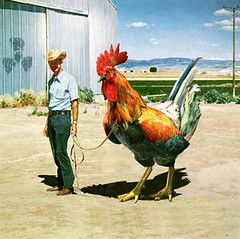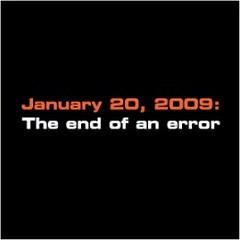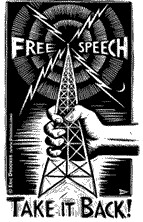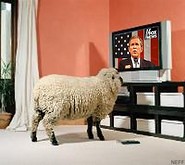The elections Bush didn't want
While I certainly hope with al my might that the Iraqis will taste the democracy they deserve and that what has been taking place there is the begining of a true democratic and populist government, I cannot but think that all that is happening is despite our presence and despite all the efforts made by the Bush Administration to prevent it. More power to the Iraqis... I hope they make it.
The elections Bush didn't want | From Needlenose
June 2003: The original U.S. plan following the invasion was to ensure that we got the Iraq we wanted, and so elections would be held only after a new national constitution had been written by a handpicked, exile-led group. Indeed, ourcolonial provisional administration was so afraid of the people's will that we cancelled ad-hoc local elections all across Iraq in June of 2003. (Subsequent protests in Najaf, the home city of the Shiite religious establishment led by Grand Ayatollah Sistani, included banners that read, "Canceled elections are evidence of bad intentions.")
Perhaps not coincidentally, within days Grand Ayatollah Sistani issued a fatwa calling for national elections as the only acceptable way to choose the assembly that would draft a constitution, specifically rejecting the U.S. plans to appoint a committee.
Fall 2003: As richly documented in this space, the American administration tried in vain to ignore or sidestep Sistani's decree for several months, until it became clear that the Iraqi would-be puppets on the so-called Governing Council were refusing to go along with the scam.
The U.S. solution, of course, was to come up with a new scam -- a complicated series of steps with "caucuses" (indirect elections, with participants vetted by the Americans) to choose an interim governmen that would be given nominal sovereignty, with Iraqis not allowed to vote directly for their own leaders until the end of 2005. Sistani's response was to say, in essence, "What part of 'elections' don't you understand?", demanding full national elections by June 2004.
January 2004: As the Bushites continued to dither and balk (including quashing a census plan that would have enabled faster elections), Sistani was forced to organize massive demonstrations in Basra and Baghdad (shown in the picture above) to make his growing impatience clear.
Seeing hundreds of thousands of Shiites in the streets of Baghdad, the denizens of Dubyaville promptly crapped their pants. Although still whining about infeasibility of elections, Bush and his appointed colonial ruler Jerry Bremer invited the UN to design a new transition, just as Sistani had demanded.
February-May 2004: The Bushites then did their best work behind the scenes, pressuring Kofi Annan to yield to an election date after the U.S. voting in November, pushing through a "transitional administrative law" intended to influence the eventual constitution, and promoting Iyad Allawi as temp prime minister over the UN's choice, Hussein Shahristani (an adviser to Sistani).
Nevertheless, Sistani came away with the bulk of the winnings -- not just direct elections for a government that would write the constitution, occurring at least a year earlier than the Americans originally envisioned, but UN involvement to at least partially minimize the threat of fraud by the interim regime. For good measure, he successfully lobbied the UN to ignore the transitional law written by the Americans, giving his allies the option to declare it a dead letter if they wish.
Pleased with his handiwork, Sistani issued a new fatwa, declaring voting in today's election to be a religious duty for his millions of Shiite followers. Not only that, he orchestrated the creation of a Shiite slate, and his picture has been the primary image on the campaign literature plastered nationwide by his network of loyalists. This unprecedented political involvement has been the driving factor behind the large Shiite turnout reported today.
So, whatever his ultimate intentions for Iraq are, you can thank Grand Ayatollah Sistani for these elections -- his determination made them happen, and his fervent endorsement of voting gave them whatever level of success they achieve. George Bush? He's claiming credit on the surface, but away from the cameras he's grimacing and scheming to keep Sistani from forcing any more unwanted democracy down his throat."
The elections Bush didn't want | From Needlenose
June 2003: The original U.S. plan following the invasion was to ensure that we got the Iraq we wanted, and so elections would be held only after a new national constitution had been written by a handpicked, exile-led group. Indeed, our
Perhaps not coincidentally, within days Grand Ayatollah Sistani issued a fatwa calling for national elections as the only acceptable way to choose the assembly that would draft a constitution, specifically rejecting the U.S. plans to appoint a committee.
Fall 2003: As richly documented in this space, the American administration tried in vain to ignore or sidestep Sistani's decree for several months, until it became clear that the Iraqi would-be puppets on the so-called Governing Council were refusing to go along with the scam.
The U.S. solution, of course, was to come up with a new scam -- a complicated series of steps with "caucuses" (indirect elections, with participants vetted by the Americans) to choose an interim governmen that would be given nominal sovereignty, with Iraqis not allowed to vote directly for their own leaders until the end of 2005. Sistani's response was to say, in essence, "What part of 'elections' don't you understand?", demanding full national elections by June 2004.
January 2004: As the Bushites continued to dither and balk (including quashing a census plan that would have enabled faster elections), Sistani was forced to organize massive demonstrations in Basra and Baghdad (shown in the picture above) to make his growing impatience clear.
Seeing hundreds of thousands of Shiites in the streets of Baghdad, the denizens of Dubyaville promptly crapped their pants. Although still whining about infeasibility of elections, Bush and his appointed colonial ruler Jerry Bremer invited the UN to design a new transition, just as Sistani had demanded.
February-May 2004: The Bushites then did their best work behind the scenes, pressuring Kofi Annan to yield to an election date after the U.S. voting in November, pushing through a "transitional administrative law" intended to influence the eventual constitution, and promoting Iyad Allawi as temp prime minister over the UN's choice, Hussein Shahristani (an adviser to Sistani).
Nevertheless, Sistani came away with the bulk of the winnings -- not just direct elections for a government that would write the constitution, occurring at least a year earlier than the Americans originally envisioned, but UN involvement to at least partially minimize the threat of fraud by the interim regime. For good measure, he successfully lobbied the UN to ignore the transitional law written by the Americans, giving his allies the option to declare it a dead letter if they wish.
Pleased with his handiwork, Sistani issued a new fatwa, declaring voting in today's election to be a religious duty for his millions of Shiite followers. Not only that, he orchestrated the creation of a Shiite slate, and his picture has been the primary image on the campaign literature plastered nationwide by his network of loyalists. This unprecedented political involvement has been the driving factor behind the large Shiite turnout reported today.
So, whatever his ultimate intentions for Iraq are, you can thank Grand Ayatollah Sistani for these elections -- his determination made them happen, and his fervent endorsement of voting gave them whatever level of success they achieve. George Bush? He's claiming credit on the surface, but away from the cameras he's grimacing and scheming to keep Sistani from forcing any more unwanted democracy down his throat."










0 Comments:
Post a Comment
<< Home